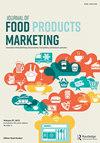Implicit and Explicit Attitudes toward Foods Derived from Genome Editing and Genetic Modification Technologies under Different Information Treatments
IF 2.4
Q2 BUSINESS
引用次数: 4
Abstract
ABSTRACT Genome editing technologies represent a potential revolution in plant breeding methods. However, there is a limitation in understanding the consumers’ attitudes toward foods derived from this novel technology. Especially, the lack of knowledge and confusion in differentiating with genetically modified (GM) products could potentially restrict further development of genome-edited (GE) foods. Therefore, a survey of 407 Vietnamese consumers was conducted to analyze the implicit and explicit attitudes toward GE foods compared to GM foods under different information treatments. The implicit association test (IAT) was used for implicit evaluation, and semantic differential scales were used for explicit evaluation. As our important results, under the context of condensed information, the implicit measure shows a high correlation between attitudes toward GE and GM foods. This result is one of the initial pieces of evidence that has been shown about the relationship among consumers’ attitudes toward GE and GM foods. And as our result has been pointed out that providing in-depth information help to reduce the correlation between attitudes toward GE and GM foods. This evidence is important to suggest effective risk-benefits communication to help reduce negative attitudes toward GE food and increase consumers’ acceptance.不同信息处理下基因组编辑和基因修饰技术对食品的内隐和外显态度
摘要基因组编辑技术代表了植物育种方法的一场潜在革命。然而,在理解消费者对这种新技术衍生的食品的态度方面存在局限性。特别是,在与转基因产品区分方面缺乏知识和混乱,可能会限制基因组编辑食品的进一步发展。因此,对407名越南消费者进行了调查,以分析在不同信息处理下,与转基因食品相比,对转基因食品的内隐和外显态度。内隐联想测验(IAT)用于内隐评价,语义差异量表用于外显评价。作为我们的重要结果,在浓缩信息的背景下,内隐测量显示了对转基因食品和转基因食品的态度之间的高度相关性。这一结果是关于消费者对通用电气和转基因食品态度之间关系的初步证据之一。正如我们的研究结果所指出的,提供深入的信息有助于减少对通用电气和转基因食品的态度之间的相关性。这一证据对于建议有效的风险收益沟通非常重要,有助于减少对通用电气食品的负面态度,提高消费者的接受度。
本文章由计算机程序翻译,如有差异,请以英文原文为准。
求助全文
约1分钟内获得全文
求助全文
来源期刊

Journal of Food Products Marketing
BUSINESS-
CiteScore
5.70
自引率
6.90%
发文量
17
期刊介绍:
From food promotion and advertising through new food product development and consumer behavior research, the Journal of Food Products Marketing provides timely, practical articles that keep food marketers on the cutting edge of their profession. The journal includes refereed research studies as well as opinions, guidelines, and speeches by practitioners that contribute to the better practice and understanding of food marketing. The journal provides a single forum for both food marketing academicians and food marketing practitioners.
 求助内容:
求助内容: 应助结果提醒方式:
应助结果提醒方式:


